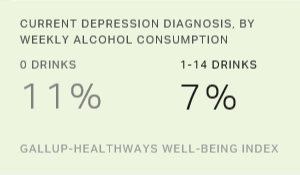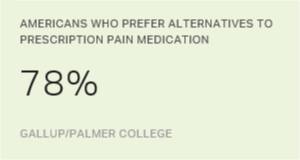Story Highlights
- Moderate drinkers less likely to have had depression diagnosis
- Moderate drinkers more likely to experience positive emotions
WASHINGTON, D.C. -- U.S. adults who drink in moderation -- one to 14 drinks per week -- are slightly less likely than both nondrinkers and heavy drinkers to have been diagnosed with depression in their lifetime. Thirteen percent of moderate drinkers have been diagnosed with depression at some point in their lives, compared with 19% of nondrinkers and 17% of heavy drinkers. Moderate drinkers (7%) and heavy drinkers (8%) are also less likely than nondrinkers (11%) to report that they currently have or are being treated for depression.
| 0% | 1 to 14% | 15+ % | |||||||||||||||||||||||||||||||||||||||||||||||||||||||||||||||||||||||||||||||||||||||||||||||||
|---|---|---|---|---|---|---|---|---|---|---|---|---|---|---|---|---|---|---|---|---|---|---|---|---|---|---|---|---|---|---|---|---|---|---|---|---|---|---|---|---|---|---|---|---|---|---|---|---|---|---|---|---|---|---|---|---|---|---|---|---|---|---|---|---|---|---|---|---|---|---|---|---|---|---|---|---|---|---|---|---|---|---|---|---|---|---|---|---|---|---|---|---|---|---|---|---|---|---|---|
| Depressed at some point in lifetime | 19 | 13 | 17 | ||||||||||||||||||||||||||||||||||||||||||||||||||||||||||||||||||||||||||||||||||||||||||||||||
| Depressed currently | 11 | 7 | 8 | ||||||||||||||||||||||||||||||||||||||||||||||||||||||||||||||||||||||||||||||||||||||||||||||||
| Jan. 2, 2014-Dec.15, 2015 | |||||||||||||||||||||||||||||||||||||||||||||||||||||||||||||||||||||||||||||||||||||||||||||||||||
| Gallup-Healthways Well-Being Index | |||||||||||||||||||||||||||||||||||||||||||||||||||||||||||||||||||||||||||||||||||||||||||||||||||
These findings, based on daily interviews conducted from Jan. 2, 2014-Dec. 15, 2015, are from the 2015 Gallup-Healthways Well-Being Index. Similar to the way the U.S. Centers for Disease Control and Prevention (CDC) define it, Gallup and Healthways define moderate drinking as having one to two drinks per day. Using the moderate drinking threshold of one to two drinks a day, this analysis termed moderate drinking as one to 14 drinks a week. While the CDC defines heavy drinking differently for men and for women, for this study, Gallup and Healthways defined heavy drinking for both genders as consuming 15 or more drinks per week. These results control for age, gender, race, ethnicity, education, income, marital status and children in household.
Overall, more than half of U.S. adults, 54.9%, say they have zero drinks per week, while 41.4% report drinking one to 14 drinks per week and 3.7% have 15 or more drinks.
Moderate Drinkers More Likely to Report Experiencing Positive Emotions
| 0% | 1 to 14% | 15+% | |||||||||||||||||||||||||||||||||||||||||||||||||||||||||||||||||||||||||||||||||||||||||||||||||
|---|---|---|---|---|---|---|---|---|---|---|---|---|---|---|---|---|---|---|---|---|---|---|---|---|---|---|---|---|---|---|---|---|---|---|---|---|---|---|---|---|---|---|---|---|---|---|---|---|---|---|---|---|---|---|---|---|---|---|---|---|---|---|---|---|---|---|---|---|---|---|---|---|---|---|---|---|---|---|---|---|---|---|---|---|---|---|---|---|---|---|---|---|---|---|---|---|---|---|---|
| Happiness most of the day yesterday | 89 | 92 | 89 | ||||||||||||||||||||||||||||||||||||||||||||||||||||||||||||||||||||||||||||||||||||||||||||||||
| Enjoyment most of the day yesterday | 85 | 89 | 83 | ||||||||||||||||||||||||||||||||||||||||||||||||||||||||||||||||||||||||||||||||||||||||||||||||
| Smile or laugh a lot nearly every day | 81 | 85 | 81 | ||||||||||||||||||||||||||||||||||||||||||||||||||||||||||||||||||||||||||||||||||||||||||||||||
| Jan. 2, 2014-Dec.15, 2015 | |||||||||||||||||||||||||||||||||||||||||||||||||||||||||||||||||||||||||||||||||||||||||||||||||||
| Gallup-Healthways Well-Being Index | |||||||||||||||||||||||||||||||||||||||||||||||||||||||||||||||||||||||||||||||||||||||||||||||||||
In addition to being less likely to have been diagnosed with depression at some point in their lives, moderate drinkers are also more likely than nondrinkers and heavy drinkers to report experiencing positive emotions on any given day, including happiness, enjoyment, and smiling or laughing. Nondrinkers and heavy drinkers do not differ significantly from each other in their reports of positive emotions.
| 0% | 1 to 14% | 15+% | |||||||||||||||||||||||||||||||||||||||||||||||||||||||||||||||||||||||||||||||||||||||||||||||||
|---|---|---|---|---|---|---|---|---|---|---|---|---|---|---|---|---|---|---|---|---|---|---|---|---|---|---|---|---|---|---|---|---|---|---|---|---|---|---|---|---|---|---|---|---|---|---|---|---|---|---|---|---|---|---|---|---|---|---|---|---|---|---|---|---|---|---|---|---|---|---|---|---|---|---|---|---|---|---|---|---|---|---|---|---|---|---|---|---|---|---|---|---|---|---|---|---|---|---|---|
| Worry most of the day yesterday | 31 | 29 | 35 | ||||||||||||||||||||||||||||||||||||||||||||||||||||||||||||||||||||||||||||||||||||||||||||||||
| Sadness most of the day yesterday | 17 | 16 | 19 | ||||||||||||||||||||||||||||||||||||||||||||||||||||||||||||||||||||||||||||||||||||||||||||||||
| Little interest or pleasure in doing things nearly every day | 16 | 13 | 18 | ||||||||||||||||||||||||||||||||||||||||||||||||||||||||||||||||||||||||||||||||||||||||||||||||
| Jan. 2, 2014-Dec.15, 2015 | |||||||||||||||||||||||||||||||||||||||||||||||||||||||||||||||||||||||||||||||||||||||||||||||||||
| Gallup-Healthways Well-Being Index | |||||||||||||||||||||||||||||||||||||||||||||||||||||||||||||||||||||||||||||||||||||||||||||||||||
Negative daily emotions, in turn, are less common among moderate drinkers. Moderate drinkers are slightly less likely than nondrinkers and heavy drinkers to report experiencing negative emotions, including worry or stress "yesterday" and having little interest or pleasure in doing things nearly every day. Moderate drinkers and nondrinkers report similar rates of sadness, but both groups are slightly less likely than heavy drinkers to experience sadness. Still, while heavy drinkers and nondrinkers report similar levels of positive emotions, heavy drinkers report experiencing more negative emotions than nondrinkers.
Bottom Line
Research into how alcohol consumption affects health has shown that moderate drinking is linked to lower rates of cardiovascular disease, diabetes and mortality, but could still increase one's risk of developing breast cancer. When it comes to the effect of alcohol consumption on mental and emotional health, a prominent medical study conducted in 1985 by clinical psychologist Cynthia Baum-Baicker showed that both heavy drinkers and nondrinkers have higher rates of clinical depression than moderate drinkers. The study also found that moderate alcohol consumption can increase overall happiness, euphoria, friendliness and pleasant feelings. A more recent study published in the Oxford Journal in 2006 found that for both men and women, moderate alcohol consumption led to improved cognition and fewer symptoms of depression.
The latest results from the Gallup-Healthways Well-Being Index are consistent with these findings and add to a body of research showing that for those who can safely drink alcohol, moderate consumption may yield mental and emotional health benefits. However, any study of the effect of drinking alcohol on health must take into account that drinking can be very harmful to those who abuse it and to those with certain medical conditions.
It is important to note that while this study controlled for the effect of a number of demographic variables, the relationship between alcohol use and depression is complex, and other variables may play a role in the relationship. It is also true that the directionality between the two is not established in these results. It is possible that people with poorer emotional health are more likely to choose abstaining from alcohol or heavy drinking than those with good emotional health. However, it could also be the case that moderate drinking is linked to emotional health benefits.
Previous Gallup research has shown that fewer than one in five, 17%, of Americans believe that moderate drinking is good for one's health, well below the 28% who say moderate drinking is bad for one's health and the 52% who say it makes no difference. However, with Gallup-Healthways data showing the link between moderate drinking and lower depression rates and more positive emotions, the recently reported decline in U.S. adults' belief that moderate drinking is good for one's health may be at least partially misplaced.
Survey Methods
Results are based on telephone interviews conducted Jan. 2, 2014-Dec. 15, 2015, as part of the Gallup-Healthways Well-Being Index survey, with a random sample of 347,915 adults, aged 18 and older, living in all 50 U.S. states and the District of Columbia. For results based on the total sample of national adults, the margin of sampling error is ±0.21 percentage points at the 95% confidence level.
For results based on the total sample of nondrinkers, the margin of sampling error is ±0.28 percentage points at the 95% confidence level.
For results based on the total sample of moderate drinkers, the margin of sampling error is ±0.31 percentage points at the 95% confidence level.
For results based on the total sample of heavy drinkers, the margin of sampling error is ±1.06 percentage points at the 95% confidence level.
All reported margins of sampling error include computed design effects for weighting.
For data collected prior to Sep. 1, 2015, each sample of national adults includes a minimum quota of 50% cellphone respondents and 50% landline respondents. For data collected between Sep. 1, 2015, and Dec. 15, 2015, each sample of national adults includes a minimum quota of 60% cellphone respondents and 40% landline respondents. Additional minimum quotas by time zone within region are included in the sampling approach.
Learn more about how the Gallup-Healthways Well-Being Index works.

